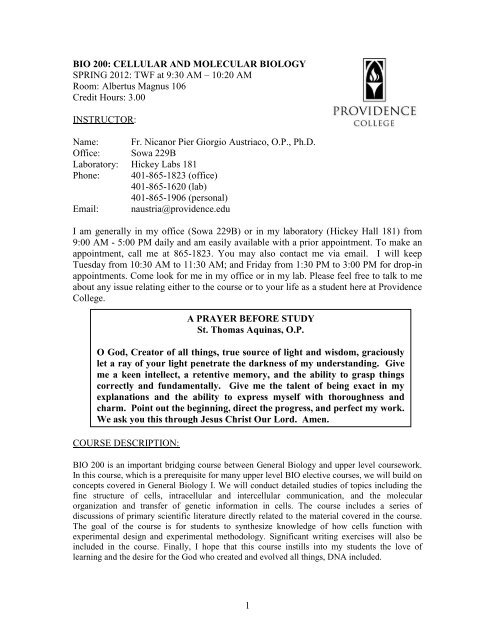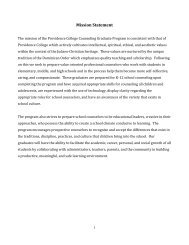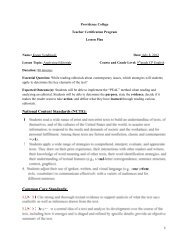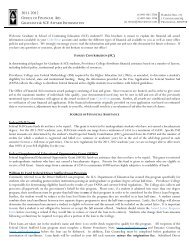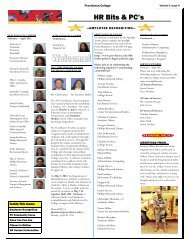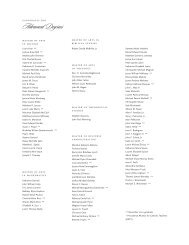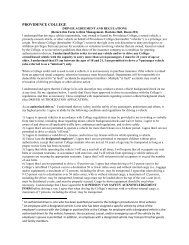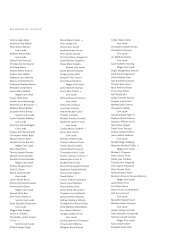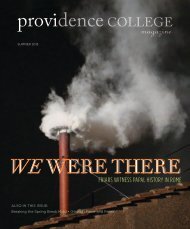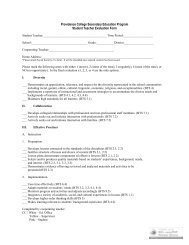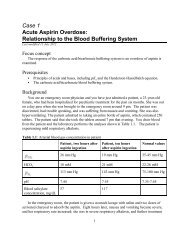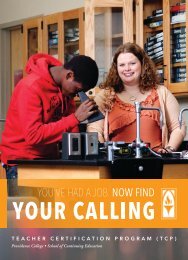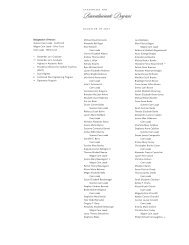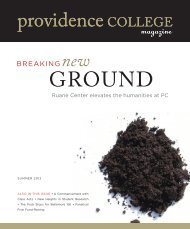BIO200 Cell Biology and Molecular Genetics - Providence College
BIO200 Cell Biology and Molecular Genetics - Providence College
BIO200 Cell Biology and Molecular Genetics - Providence College
You also want an ePaper? Increase the reach of your titles
YUMPU automatically turns print PDFs into web optimized ePapers that Google loves.
BIO 200: CELLULAR AND MOLECULAR BIOLOGY<br />
SPRING 2012: TWF at 9:30 AM – 10:20 AM<br />
Room: Albertus Magnus 106<br />
Credit Hours: 3.00<br />
INSTRUCTOR:<br />
Name: Fr. Nicanor Pier Giorgio Austriaco, O.P., Ph.D.<br />
Office: Sowa 229B<br />
Laboratory: Hickey Labs 181<br />
Phone: 401-865-1823 (office)<br />
401-865-1620 (lab)<br />
401-865-1906 (personal)<br />
Email: naustria@providence.edu<br />
I am generally in my office (Sowa 229B) or in my laboratory (Hickey Hall 181) from<br />
9:00 AM - 5:00 PM daily <strong>and</strong> am easily available with a prior appointment. To make an<br />
appointment, call me at 865-1823. You may also contact me via email. I will keep<br />
Tuesday from 10:30 AM to 11:30 AM; <strong>and</strong> Friday from 1:30 PM to 3:00 PM for drop-in<br />
appointments. Come look for me in my office or in my lab. Please feel free to talk to me<br />
about any issue relating either to the course or to your life as a student here at <strong>Providence</strong><br />
<strong>College</strong>.<br />
COURSE DESCRIPTION:<br />
A PRAYER BEFORE STUDY<br />
St. Thomas Aquinas, O.P.<br />
O God, Creator of all things, true source of light <strong>and</strong> wisdom, graciously<br />
let a ray of your light penetrate the darkness of my underst<strong>and</strong>ing. Give<br />
me a keen intellect, a retentive memory, <strong>and</strong> the ability to grasp things<br />
correctly <strong>and</strong> fundamentally. Give me the talent of being exact in my<br />
explanations <strong>and</strong> the ability to express myself with thoroughness <strong>and</strong><br />
charm. Point out the beginning, direct the progress, <strong>and</strong> perfect my work.<br />
We ask you this through Jesus Christ Our Lord. Amen.<br />
BIO 200 is an important bridging course between General <strong>Biology</strong> <strong>and</strong> upper level coursework.<br />
In this course, which is a prerequisite for many upper level BIO elective courses, we will build on<br />
concepts covered in General <strong>Biology</strong> I. We will conduct detailed studies of topics including the<br />
fine structure of cells, intracellular <strong>and</strong> intercellular communication, <strong>and</strong> the molecular<br />
organization <strong>and</strong> transfer of genetic information in cells. The course includes a series of<br />
discussions of primary scientific literature directly related to the material covered in the course.<br />
The goal of the course is for students to synthesize knowledge of how cells function with<br />
experimental design <strong>and</strong> experimental methodology. Significant writing exercises will also be<br />
included in the course. Finally, I hope that this course instills into my students the love of<br />
learning <strong>and</strong> the desire for the God who created <strong>and</strong> evolved all things, DNA included.<br />
1
REQUIRED TEXTS:<br />
Hardin et al., Becker's World of the <strong>Cell</strong>, 8th edn. (San Francisco: Pearson Benjamin<br />
Cummings, 2011) ISBN 978-0321716026<br />
We will also be reading papers from the primary scientific literature to illustrate the logic<br />
of contemporary cellular <strong>and</strong> molecular biology. The papers are listed on the syllabus <strong>and</strong><br />
have been posted to the class website on ANGEL.<br />
ACADEMIC EXPECTATIONS:<br />
EXAMINATIONS: Exams are designed to thoroughly test your underst<strong>and</strong>ing of the<br />
information <strong>and</strong> concepts covered in lecture. As such, you will be asked to apply your<br />
knowledge <strong>and</strong> thinking skills to new situations, not merely memorize information. For<br />
this class, the exams will include material from the lecture <strong>and</strong> from analysis of primary<br />
scientific literature articles. Primary scientific literature papers will be h<strong>and</strong>ed out one<br />
week in advance of the exam. You are permitted to consult the primary paper <strong>and</strong> your<br />
notes on the paper while answering the in-class exam. Portions of exams may be given as<br />
take-home questions.<br />
PRIMARY SCIENTIFIC LITERATURE ASSIGNMENTS AND DISCUSSIONS: The primary<br />
scientific literature assignments are designed to enhance the traditional lecture material<br />
by allowing you to apply your knowledge of <strong>Cell</strong>ular <strong>and</strong> <strong>Molecular</strong> <strong>Biology</strong> to classical<br />
<strong>and</strong> current research literature. Since we will dedicate a significant amount of time to<br />
discussing primary scientific literature, it is vital for students to prepare before coming to<br />
the class discussion.<br />
For each research paper assigned for discussion, students are required to annotate their<br />
copy of each paper as described in the h<strong>and</strong>outs given out prior to each paper discussion<br />
session. Annotated papers will be submitted to the instructor at the end of the paper<br />
discussion period. These annotations will be graded based on demonstrable due diligence<br />
on the student’s part <strong>and</strong> will be given a grade of 0 (did not complete the assignment),<br />
50% (incomplete effort) or 100% (complete effort).<br />
Participation in class will also be assessed every week especially during discussions of<br />
the primary scientific literature. Students will be able to drop the lowest three<br />
participation grades.<br />
INTENSIVE WRITING I PROFICIENCY: This course is being evaluated as a potential way for<br />
<strong>Biology</strong> majors to satisfy the Intensive Writing I proficiency requirement of the new core<br />
curriculum. The goal of this proficiency is for students to significantly improve their<br />
scientific writing ability through practice <strong>and</strong> instructor feedback. To satisfy the Intensive<br />
Writing I proficiency each student will 1) complete four 700-800 word written<br />
assignments related to primary scientific literature that we discuss in class <strong>and</strong> 2) write a<br />
2500 word final paper related to a piece of primary scientific literature. For all five of<br />
these assignments students are required to submit a draft of the assignment for instructor<br />
2
feedback <strong>and</strong> preliminary grading. 30% of the grade for each writing assignment will<br />
come from an assessment of the quality of the effort put into the draft. After revising the<br />
draft <strong>and</strong> incorporating instructor feedback, students will submit a final version of the<br />
assignment for final grading (70% of the points for the assignment).<br />
ATTENDANCE POLICY: Regular attendance is expected. Please email the instructor in<br />
advance if you expect to miss a class. More than two unexcused absences during the<br />
semester may lead to a final grade reduction of a full letter grade (e.g., B+ to C+).<br />
GRADING POLICY: Grades will be calculated as follows:<br />
Midterm Exam I 15%<br />
Midterm Exam II 15%<br />
Final Exam: 25%<br />
Primary Literature Assignments 15%<br />
Class Participation 10%<br />
Final Paper: 20%<br />
Total: 100%<br />
COLLABORATION POLICY: I believe that collaboration fosters a healthy <strong>and</strong> enjoyable<br />
educational environment. I encourage you to talk with other students about the course<br />
material <strong>and</strong> to form study groups. Unless otherwise instructed, you may discuss<br />
assignments <strong>and</strong> lab problems with other students <strong>and</strong> exchange ideas about how to solve<br />
the problems. However, there is a thin line between collaboration <strong>and</strong> plagiarizing the<br />
work of others. You may discuss strategies for approaching the assignments with your<br />
classmates <strong>and</strong> may receive general advice from them, but you are required to compose<br />
your own answers.<br />
ACADEMIC INTEGRITY POLICY: Academic dishonesty, cheating, <strong>and</strong> plagiarism (“the<br />
stealing <strong>and</strong> passing off of the ideas or words of another as one’s own without crediting<br />
the source”) are not tolerated in the professional world of scientific <strong>and</strong> medical research<br />
<strong>and</strong> will not be tolerated in this class. For the first offense, the student will receive a zero<br />
for the examination or the assignment. If a student aids another student during the exam,<br />
both parties will receive a zero. For the second offense, the student or students will<br />
receive an F for the course. Please consult the current <strong>Providence</strong> <strong>College</strong> Undergraduate<br />
Catalogue for its statement on “Academic Honesty.”<br />
STUDENTS WITH SPECIAL NEEDS: Students with special needs who are taking this class<br />
<strong>and</strong> who need special accommodations (for example, for learning, attention, or physical<br />
disabilities) are encouraged to work with Office of Academic Services (OAS) <strong>and</strong> the<br />
instructor to arrange accommodations. Arrangements must be made first with the OAS,<br />
who will notify <strong>and</strong> work with the instructor to make appropriate arrangements.<br />
3
WORKING SYLLABUS<br />
Class Date Topic Reading Assignments<br />
1<br />
2<br />
3<br />
4<br />
5<br />
6<br />
7<br />
T<br />
1/17<br />
W<br />
1/18<br />
F<br />
1/20<br />
T<br />
1/24<br />
W<br />
1/25<br />
F<br />
1/27<br />
T<br />
1/31<br />
Introduction Chapter 1<br />
<strong>Cell</strong> Chemistry <strong>and</strong><br />
Macromolecules<br />
<strong>Cell</strong> Chemistry <strong>and</strong><br />
Macromolecules<br />
Chapters 2, 3<br />
Chapters 2, 3<br />
<strong>Cell</strong>s <strong>and</strong> Organelles Chapter 4<br />
Membrane Structure <strong>and</strong><br />
Function<br />
Membrane Structure <strong>and</strong><br />
Function<br />
Membrane Structure <strong>and</strong><br />
Function<br />
Chapter 7, 8<br />
Chapter 7, 8<br />
Chapter 7, 8<br />
8<br />
W<br />
2/1<br />
Primary Scientific Literature<br />
Discussion 1<br />
Tal et al. (2007)<br />
9 F 2/3 Bioenergetics <strong>and</strong> Enzymes Chapters 5, 6<br />
10<br />
11<br />
12<br />
13<br />
14<br />
15<br />
16<br />
17<br />
18<br />
19<br />
T<br />
2/7<br />
W<br />
2/8<br />
F<br />
2/10<br />
T<br />
2/14<br />
W<br />
2/15<br />
F<br />
2/17<br />
T<br />
2/21<br />
W<br />
2/22<br />
F<br />
2/24<br />
T<br />
2/28<br />
W<br />
2/29<br />
Bioenergetics <strong>and</strong> Enzymes Chapters 5, 6<br />
The Endomembrane System Chapter 12<br />
The Endomembrane System Chapter 12<br />
The Endomembrane System Chapter 12<br />
Signal Transduction Chapter 13, 14<br />
MIDTERM EXAM I<br />
No Class – Monday Schedule<br />
Signal Transduction Chapter 13, 14<br />
Signal Transduction Chapter 13, 14<br />
Cytoskeleton Structure <strong>and</strong><br />
Function<br />
Primary Scientific Literature<br />
Discussion 2<br />
Chapter 15, 16<br />
Tomasovic et al.<br />
(2012)<br />
Draft of Writing<br />
Assignment 1 due<br />
Writing Assignment 1<br />
due<br />
4
20 F 3/2<br />
21<br />
22<br />
T<br />
3/6<br />
W<br />
3/7<br />
23 F 3/9<br />
24<br />
25<br />
26<br />
27<br />
28<br />
29<br />
30<br />
31<br />
32<br />
33<br />
34<br />
35<br />
36<br />
37<br />
T<br />
3/13<br />
W<br />
3/14<br />
F<br />
3/16<br />
T<br />
3/20<br />
W<br />
3/21<br />
F<br />
3/23<br />
T<br />
3/27<br />
W<br />
3/28<br />
F<br />
3/30<br />
T<br />
4/3<br />
W<br />
4/4<br />
F 4/6<br />
T<br />
4/10<br />
W<br />
4/11<br />
F<br />
4/13<br />
T<br />
4/17<br />
W<br />
4/18<br />
F<br />
4/20<br />
T<br />
4/24<br />
Cytoskeleton Structure <strong>and</strong><br />
Function<br />
Cytoskeleton Structure <strong>and</strong><br />
Function<br />
<strong>Cell</strong> Junctions <strong>and</strong> the<br />
Extracellular Matrix<br />
<strong>Cell</strong> Junctions <strong>and</strong> the<br />
Extracellular Matrix<br />
No Class – Spring Break<br />
No Class – Spring Break<br />
No Class – Spring Break<br />
Chapter 15, 16<br />
Chapter 15, 16<br />
Chapter 17<br />
Chapter 17<br />
DNA <strong>and</strong> the Nucleus Chapter 18<br />
Primary Scientific Literature<br />
Discussion 3<br />
Tikhmyanova<br />
& Golemis (2011)<br />
DNA <strong>and</strong> the Nucleus Chapter 18<br />
DNA <strong>and</strong> the Nucleus Chapter 18<br />
MIDTERM EXAM II<br />
DNA Replication <strong>and</strong> Mitosis Chapter 19<br />
DNA Replication <strong>and</strong> Mitosis Chapter 19<br />
DNA Replication <strong>and</strong> Mitosis Chapter 19<br />
No Class – Easter Recess<br />
Meiosis <strong>and</strong> Recombination Chapter 20<br />
No Class – Monday Schedule<br />
Meiosis <strong>and</strong> Recombination Chapter 20<br />
Primary Scientific Literature<br />
Discussion 4<br />
Kitamura et al.<br />
(2006)<br />
Gene Expression Chapters 21, 22<br />
Gene Expression Chapters 21, 22<br />
Regulation of Gene Expression Chapter 23<br />
Draft of Writing<br />
Assignment 2 due<br />
Writing Assignment 2<br />
due<br />
Draft of Writing<br />
Assignment 3 due<br />
Writing Assignment 3<br />
due<br />
Outline of Final Paper<br />
Due<br />
Draft of Writing<br />
Assignment 4 due<br />
Draft of Final Paper<br />
Due<br />
5
38<br />
39<br />
40<br />
41<br />
W<br />
4/25<br />
F<br />
4/27<br />
T<br />
5/1<br />
W<br />
5/2<br />
Regulation of Gene Expression Chapter 23<br />
Regulation of Gene Expression Chapter 23<br />
Cancer Chapter 24<br />
Cancer Chapter 24<br />
Writing Assignment 4<br />
due<br />
42 F 5/4 Summary <strong>and</strong> Wrap-Up Final Paper Due<br />
R<br />
5/14<br />
FINAL EXAM (Course Series<br />
“F”)<br />
8:30AM -- 10:30AM<br />
6


